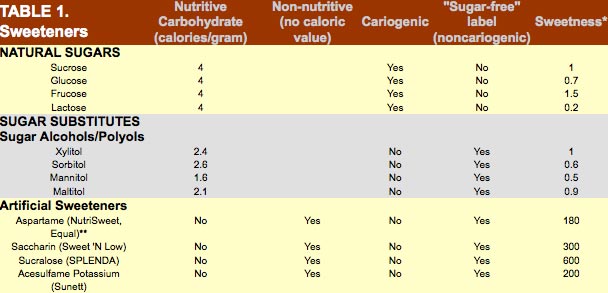Xylitol
- Xylitol is an all natural sweetener produced in small amounts in nature and even in the human body. It is much better for your teeth and mouth than sugar.
- Xylitol is absorbed by harmful bacteria in the mouth. The bacteria cannot use xylitol as an energy source and so they stop producing acids.
- Xylitol stimulates alkaline saliva which helps to balance mouth acidity.
- Xylitol protects teeth from some of the damage caused in an acidic or dry mouth.
Teeth become smoother and bacteria stop sticking to the gums and teeth. Plaque stops forming and the gums will start to slowly heal!
Xylitol is an all-natural sweetener. Chemically speaking, xylitol differs from other sweeteners such as sorbitol, fructose and glucose because its molecule has five, instead of six, carbon atoms. Most bacteria and yeast in the mouth are unable to make use of xylitol. The body does not require insulin to metabolize xylitol. For this reason polyols like xylitol produce a lower glycemic response than sucrose or glucose, Xylitol has also been proven to inhibit the growth of bacteria. Xylitol was discovered almost simultaneously by German and French chemists in the late 19th century and has been used extensively in Europe since World War II. Its dental significance was researched in Finland in the early 1970′s, when scientists showed it had significant dental benefits. In Finland, Sweden, Japan and many other countries, xylitol is widely used in candy, gum and oral care products. While xylitol is fairly new in the U.S. market, its use is rapidly increasing as more people become aware of its unique health benefits.
Xylitol stabilizes insulin and hormone levels, promotes good health and has none of the negative side effects of white sugar or artificial sweeteners. Xylitol is a natural insulin stabilizer, therefore it doesn’t cause a spike on blood sugar and actually helps reduce sugar and carbohydrate cravings.
Xylitol has no known toxic levels, A large percentage passes through the body before the carbohydrates are absorbed thereby making it safe for diabetics or anyone pursuing a healthy lifestyle. Extracted from U.S. grown Hardwood trees. We believe that the practices employed in the harvesting and processing are ecologically sustainable.
Xylitol has a glycemic index of seven while sugar is 68. Classified as a sugar alcohol, it differs from the ’sugar’ because it does not support oral bacteria and inhibits plaque formation. Xylitol doesn’t ferment so it can’t produce acid. Maintaining a neutral pH level in the mouth is beneficial as an alkaline environment is inhospitable to destructive bacteria.
The frequency of Xylitol consumed, is really more important than the amount consumed. The recommended dosage for children is 3g to 8g per day, and for adults, 6g to 12g per day. Since there are always harmful bacteria in our mouths, xylitol is most effective if consumed throughout the day. “Strive for five” exposures of xylitol every day. These exposures should be divided into several doses throughout the day in the form of toothpaste, mouthwash, mints, and chewing gum.

*Sucrose (table sugar) is the standard value of “1” that the other sweeteners are compared with to determine their level sweetness.
** Aspartame is technically a nutritive sweetener. Because of its intense sweetness however, it is used in such small amounts that its nutritive value is negligible.
Xylitol is approved for use by:
The US Food and Drug Administration
The World Health Organization
American Academy of Pediatric Dentistry
The European’s Union’s Scientific Committee for Food
Calorie Control Council and many others.
